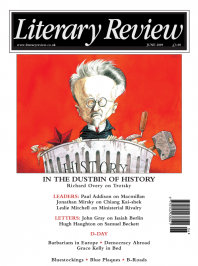Julian Preece
Nineteen Forty-Four
Alone in Berlin
By Hans Fallada (Translated by Michael Hofmann)
Penguin 568pp £20
The first question that came to mind after reading the first few pages of this fascinating novel was, why don’t I know it already? Hans Fallada wrote it immediately after the war, basing the story on a genuine case of a working-class couple who defied the regime. It was published in German just about as soon as possible in 1949, which was two years after Fallada died. Over the years it went through numerous reprints and was filmed for cinema and television in the West and the East, Fallada being an author that the Nazis, in his lifetime, and the Communists, after he died, felt they could get along with.
I remember the original title (roughly translatable as Everyone Dies for Himself) from a long-running West Berlin stage version in the 1980s. But it must have been written up so as to put off visiting foreign students hungry for scraps of German high culture. And that is surely

Sign Up to our newsletter
Receive free articles, highlights from the archive, news, details of prizes, and much more.@Lit_Review
Follow Literary Review on Twitter
Twitter Feed
It wasn’t until 1825 that Pepys’s diary became available for the first time. How it was eventually decrypted and published is a story of subterfuge and duplicity.
Kate Loveman tells the tale.
Kate Loveman - Publishing Pepys
Kate Loveman: Publishing Pepys
literaryreview.co.uk
Arthur Christopher Benson was a pillar of the Edwardian establishment. He was supremely well connected. As his newly published diaries reveal, he was also riotously indiscreet.
Piers Brendon compares Benson’s journals to others from the 20th century.
Piers Brendon - Land of Dopes & Tories
Piers Brendon: Land of Dopes & Tories - The Benson Diaries: Selections from the Diary of Arthur Christopher Benson by Eamon Duffy & Ronald Hyam (edd)
literaryreview.co.uk
Of the siblings Gwen and Augustus John, it is Augustus who has commanded most attention from collectors and connoisseurs.
Was he really the finer artist, asks Tanya Harrod, or is it time Gwen emerged from her brother’s shadow?
Tanya Harrod - Cut from the Same Canvas
Tanya Harrod: Cut from the Same Canvas - Artists, Siblings, Visionaries: The Lives and Loves of Gwen and Augustus John by Judith Mackrell
literaryreview.co.uk